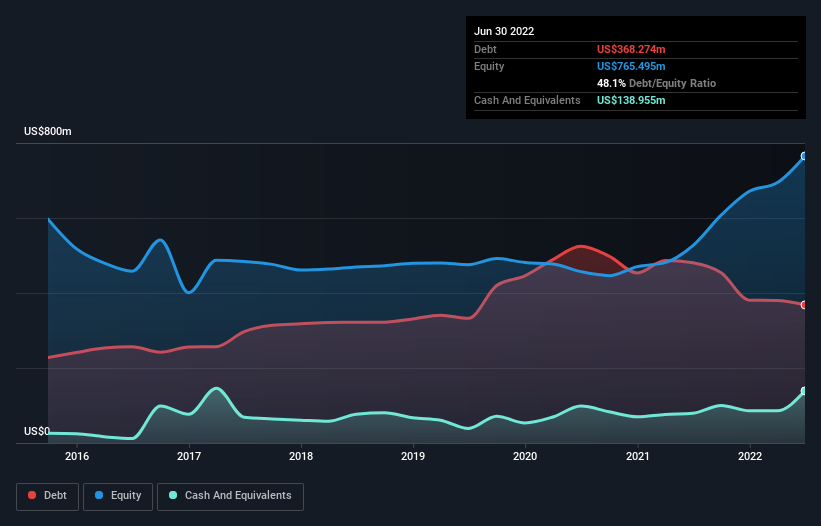- United States
- /
- Marine and Shipping
- /
- NYSE:EGLE
Eagle Bulk Shipping (NASDAQ:EGLE) Has A Pretty Healthy Balance Sheet

Some say volatility, rather than debt, is the best way to think about risk as an investor, but Warren Buffett famously said that 'Volatility is far from synonymous with risk.' So it might be obvious that you need to consider debt, when you think about how risky any given stock is, because too much debt can sink a company. Importantly, Eagle Bulk Shipping Inc. (NASDAQ:EGLE) does carry debt. But the real question is whether this debt is making the company risky.
When Is Debt Dangerous?
Debt is a tool to help businesses grow, but if a business is incapable of paying off its lenders, then it exists at their mercy. In the worst case scenario, a company can go bankrupt if it cannot pay its creditors. However, a more usual (but still expensive) situation is where a company must dilute shareholders at a cheap share price simply to get debt under control. Having said that, the most common situation is where a company manages its debt reasonably well - and to its own advantage. When we examine debt levels, we first consider both cash and debt levels, together.
Check out our latest analysis for Eagle Bulk Shipping
How Much Debt Does Eagle Bulk Shipping Carry?
The image below, which you can click on for greater detail, shows that Eagle Bulk Shipping had debt of US$368.3m at the end of June 2022, a reduction from US$480.5m over a year. However, it does have US$139.0m in cash offsetting this, leading to net debt of about US$229.3m.

How Strong Is Eagle Bulk Shipping's Balance Sheet?
We can see from the most recent balance sheet that Eagle Bulk Shipping had liabilities of US$136.5m falling due within a year, and liabilities of US$324.6m due beyond that. Offsetting this, it had US$139.0m in cash and US$43.9m in receivables that were due within 12 months. So it has liabilities totalling US$278.2m more than its cash and near-term receivables, combined.
While this might seem like a lot, it is not so bad since Eagle Bulk Shipping has a market capitalization of US$583.2m, and so it could probably strengthen its balance sheet by raising capital if it needed to. But it's clear that we should definitely closely examine whether it can manage its debt without dilution.
We use two main ratios to inform us about debt levels relative to earnings. The first is net debt divided by earnings before interest, tax, depreciation, and amortization (EBITDA), while the second is how many times its earnings before interest and tax (EBIT) covers its interest expense (or its interest cover, for short). This way, we consider both the absolute quantum of the debt, as well as the interest rates paid on it.
Eagle Bulk Shipping's net debt is only 0.59 times its EBITDA. And its EBIT covers its interest expense a whopping 14.4 times over. So you could argue it is no more threatened by its debt than an elephant is by a mouse. Even more impressive was the fact that Eagle Bulk Shipping grew its EBIT by 309% over twelve months. That boost will make it even easier to pay down debt going forward. The balance sheet is clearly the area to focus on when you are analysing debt. But ultimately the future profitability of the business will decide if Eagle Bulk Shipping can strengthen its balance sheet over time. So if you're focused on the future you can check out this free report showing analyst profit forecasts.
Finally, while the tax-man may adore accounting profits, lenders only accept cold hard cash. So it's worth checking how much of that EBIT is backed by free cash flow. During the last two years, Eagle Bulk Shipping produced sturdy free cash flow equating to 54% of its EBIT, about what we'd expect. This free cash flow puts the company in a good position to pay down debt, when appropriate.
Our View
The good news is that Eagle Bulk Shipping's demonstrated ability to cover its interest expense with its EBIT delights us like a fluffy puppy does a toddler. But, on a more sombre note, we are a little concerned by its level of total liabilities. Taking all this data into account, it seems to us that Eagle Bulk Shipping takes a pretty sensible approach to debt. While that brings some risk, it can also enhance returns for shareholders. When analysing debt levels, the balance sheet is the obvious place to start. But ultimately, every company can contain risks that exist outside of the balance sheet. For example Eagle Bulk Shipping has 2 warning signs (and 1 which is a bit unpleasant) we think you should know about.
At the end of the day, it's often better to focus on companies that are free from net debt. You can access our special list of such companies (all with a track record of profit growth). It's free.
Valuation is complex, but we're here to simplify it.
Discover if Eagle Bulk Shipping might be undervalued or overvalued with our detailed analysis, featuring fair value estimates, potential risks, dividends, insider trades, and its financial condition.
Access Free AnalysisHave feedback on this article? Concerned about the content? Get in touch with us directly. Alternatively, email editorial-team (at) simplywallst.com.
This article by Simply Wall St is general in nature. We provide commentary based on historical data and analyst forecasts only using an unbiased methodology and our articles are not intended to be financial advice. It does not constitute a recommendation to buy or sell any stock, and does not take account of your objectives, or your financial situation. We aim to bring you long-term focused analysis driven by fundamental data. Note that our analysis may not factor in the latest price-sensitive company announcements or qualitative material. Simply Wall St has no position in any stocks mentioned.
About NYSE:EGLE
Eagle Bulk Shipping
Eagle Bulk Shipping Inc. engages in the ocean transportation of dry bulk cargoes worldwide.
Moderate growth potential and slightly overvalued.
Similar Companies
Market Insights
Community Narratives




